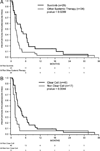Sarcomatoid-variant renal cell carcinoma: treatment outcome and survival in advanced disease
- PMID: 21127411
- PMCID: PMC3661202
- DOI: 10.1097/COC.0b013e3181f47aa4
Sarcomatoid-variant renal cell carcinoma: treatment outcome and survival in advanced disease
Abstract
Objectives: Sarcomatoid variant is a spindle cell phenotype of renal cell carcinoma (RCC), which is associated with a poor prognosis. We reviewed outcomes of systemic therapy for metastatic, sarcomatoid-variant RCC.
Methods: Clinical features, treatment outcome, and survival were evaluated in 63 patients with sarcomatoid-variant metastatic RCC (47 clear cell, 16 nonclear cell). Initial systemic treatment included antiangiogenesis-targeted therapy (n=34), cytokines (n=20), and chemotherapy (n=9).
Results: Five of 63 patients (8%) achieved an objective response to the first systemic treatment: 1 (5%) to cytokine and 4 (12%) to sunitinib-targeted therapy. Median progression-free survival for 63 patients was 3 months (95% confidence interval), and median overall survival was 10 months (95% confidence interval). The median progression-free survival for patients treated with sunitinib versus all others was 4.4 months versus 2 months (P=0.03), and 3 months for patients with clear-cell histology versus 1.6 months for nonclear-cell histology (P=0.004).
Conclusions: Metastatic sarcomatoid-variant RCC was associated with a poor response to systemic therapy. Sunitinib treatment resulted in a modest response rate, but studies to characterize the underlying tumor biology of sarcomatoid-variant RCC, to assess outcome to targeted agents, and to develop novel treatment strategies are warranted.
Conflict of interest statement
Financial disclosures: Robert J. Motzer---research funding from Pfizer, Wyeth, Novartis, and GlaxoSmithKline; consulting with Novartis. Darren Feldman---research funding from Pfizer. The other authors declare no conflicts of interest.
Figures
References
-
- Sella A, Logothetis CJ, Ro JY, et al. Sarcomatoid renal cell carcinoma. A treatable entity. Cancer. 1987;60:1313–1318. - PubMed
-
- Wu J, Caliendo G, Hu XP, et al. Impact of histology on the treatment outcome of metastatic or recurrent renal cell carcinoma. Med Oncol. 1998;15:44–49. - PubMed
-
- Escudier B, Droz JP, Rolland F, et al. Doxorubicin and ifosfamide in patients with metastatic sarcomatoid renal cell carcinoma: a phase II study of the Genitourinary Group of the French Federation of Cancer Centers. J Urol. 2002;168:959–961. - PubMed
-
- Culine S, Bekradda M, Terrier-Lacombe MJ, et al. Treatment of sarcomatoid renal cell carcinoma: is there a role for chemotherapy? Eur Urol. 1995;27:138–141. - PubMed
-
- Nanus DM, Garino A, Milowsky MI, et al. Active chemotherapy for sarcomatoid and rapidly progressing renal cell carcinoma. Cancer. 2004;101:1545–1551. - PubMed
Publication types
MeSH terms
Grants and funding
LinkOut - more resources
Full Text Sources
Medical




